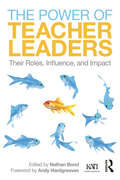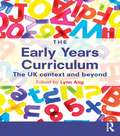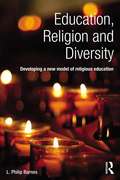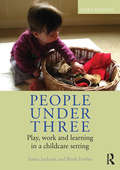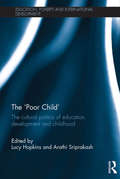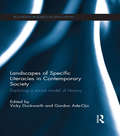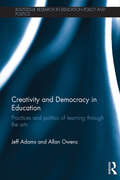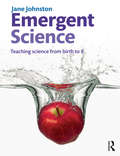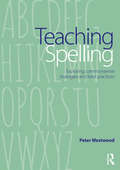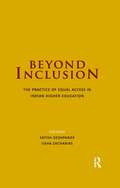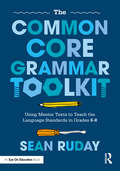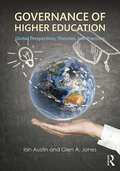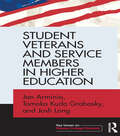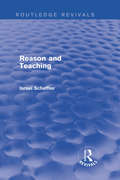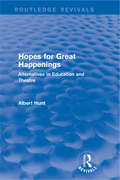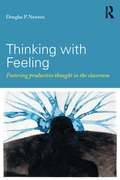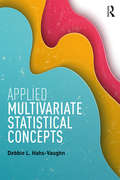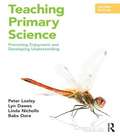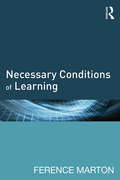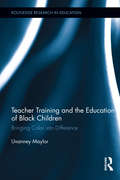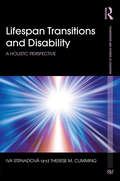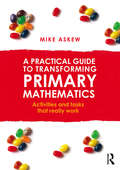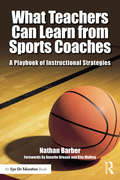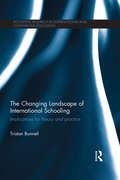- Table View
- List View
The Power of Teacher Leaders: Their Roles, Influence, and Impact (Kappa Delta Pi Co-Publications)
by Nathan BondCo-published with Kappa Delta Pi, The Power of Teacher Leaders provides a comprehensive resource for understanding the ways that teacher leaders foster positive change in their schools. Distinct from school administrators, teacher leaders are professionals who remain in the classroom and use their specialized knowledge and skills to improve student achievement, influence others, and build organizational capacity. Written by leading educational researchers, each chapter of The Power of Teacher Leaders describes a different way that teachers are leading. Moving beyond the question of why teacher leaders are important and how such work is implemented, the contributing scholars to this collection offer a critical examination of the field by presenting original research, case studies, and programs in practice. Topics covered include how teachers become leaders, their wide-ranging leadership roles, and the effects of teacher leadership on student academic success and school communities. A cohesive edited collection, this book demonstrates how teacher leaders play an increasingly active role in the improvement of student learning, teacher professional development, and school climate.
The Early Years Curriculum: The UK context and beyond
by Lynn AngThe Early Years Curriculum brings together a range of curriculum models from across the world, providing in-depth discussion on key issues and theories, and enabling readers to consider each approach to children's learning within an international context. It encourages readers to explore different ways of understanding the curriculum, and to develop a critical understanding of the key issues that shape the way a curriculum is designed.
Education, Religion and Diversity: Developing a new model of religious education
by L. Philip Barnes"In this thoughtful and provocative book Philip Barnes challenges religious educators to re-think their field, and proposes a new, post-liberal model of religious education to help them do so. His model both confronts prejudice and intolerance and also allows the voices of different religions to be heard and critically explored. While Education, Religion and Diversity is directed to a British audience the issues it raises and the alternative it proposes are important for those educators in the United States who believe that the public schools have an important role in teaching students about religion." Walter Feinberg, Professor Emeritus of Education Policy, Organization and Leadership at the University of Illinois, Urbana-Champaign. "Philip Barnes offers a penetrating and lucid analysis of the strengths and weaknesses of modern religious education in Britain. He considers a range of epistemological and methodological issues and identifies two contrasting models of religious education that have been influential, what he calls a liberal and a postmodern model. After a detailed review and criticism of both, he outlines his own new post-liberal model of religious education, one that is compatible with both confessional and non-confessional forms of religious education, yet takes religious diversity and religious truth claims seriously. Essential reading for all religious educators and those concerned with the role of religion in schools." Bernd Schröder, Professor of Practical Theology and Religious Education, University of Göttingen. "What place, if any, does religious education have in the schools of an increasingly diverse society? This lucid and authoritative book makes an incisive contribution to this crucial debate." Roger Trigg is Emeritus Professor of Philosophy, University of Warwick, and Senior Research Fellow, Ian Ramsey Centre, Oxford. The challenge of diversity is central to education in modern liberal, democratic states, and religious education is often the point where these differences become both most acute and where it is believed, of all curriculum subjects, resolutions are most likely to be found. Education, Religion and Diversity identifies and explores the commitments and convictions that have guided post-confessional religious education and concludes controversially that the subject as currently theorised and practised is incapable of challenging religious intolerance and of developing respectful relationships between people from different communities and groups within society. It is argued that despite the rhetoric of success, which religious education is obliged to rehearse in order to perpetuate its status in the curriculum and to ensure political support, a fundamentally new model of religious education is required to meet the challenge of diversity to education and to society. A new framework for religious education is developed which offers the potential for the subject to make a genuine contribution to the creation of a responsible, respectful society. Education, Religion and Diversity is a wide-ranging, provocative exploration of religious education in modern liberal democracies. It is essential reading for those concerned with the role of religion in education and for religious and theological educators who want to think critically about the aims and character of religious education.
People Under Three: Play, work and learning in a childcare setting
by Sonia Jackson Ruth ForbesServices for young children have gone through a period of rapid transformation in recent years, which have been paralleled by great advances in our knowledge of early child development. However, care and education in the first three years of life continues to be a neglected area. Thoroughly updated to take account of key policy and practice changes in childcare provision, this landmark text translates child development theory and research into everyday practice. All the practical ideas in the book have been developed and tested in nurseries, family and children’s centres and include the importance of providing opportunities for adventurous and exploratory play for babies and toddlers, understanding and responding to children's emotional needs and offering personalized and sensitive care. The book also explores different ways of working with parents and the role of early years settings and practitioners in helping to keep children safe. It includes chapters on: Childcare policy and services Planning spaces for living, learning and playing Babies in day care Heuristic play with objects Mealtimes Learning out of doors Leading and managing a childcare centre Involving and working with parents Safeguarding children People Under Three is an established practical text for all those training to work with young children or managing day care facilities. Focusing on the care and learning of very young children, it is designed specifically for those who look after them day by day, as well as being a useful resource for social work students and policy makers.
The 'Poor Child': The cultural politics of education, development and childhood (Education, Poverty and International Development)
by Arathi Sriprakash Lucy HopkinsWhy are development discourses of the ‘poor child’ in need of radical revision? What are the theoretical and methodological challenges and possibilities for ethical understandings of childhoods and poverty? The ‘poor child’ at the centre of development activity is often measured against and reformed towards an idealised and globalised child subject. This book examines why such normative discourses of childhood are in need of radical revision and explores how development research and practice can work to ‘unsettle’ the global child. It engages the cultural politics of childhood – a politics of equality, identity and representation – as a methodological and theoretical orientation to rethink the relationships between education, development, and poverty in children’s lives. This book brings multiple disciplinary perspectives, including cultural studies, sociology, and film studies, into conversation with development studies and development education in order to provide new ways of approaching and conceptualising the ‘poor child’. The researchers draw on a range of methodological frames – such as poststructuralist discourse analysis, arts based research, ethnographic studies and textual analysis – to unpack the hidden assumptions about children within development discourses. Chapters in this book reveal the diverse ways in which the notion of childhood is understood and enacted in a range of national settings, including Kenya, India, Mexico and the United Kingdom. They explore the complex constitution of children’s lives through cultural, policy, and educational practices. The volume’s focus on children’s experiences and voices shows how children themselves are challenging the representation and material conditions of their lives. The ‘Poor Child’ will be of particular interest to postgraduate students and scholars working in the fields of childhood studies, international and comparative education, and development studies.
Landscapes of Specific Literacies in Contemporary Society: Exploring a social model of literacy (Routledge Research in Education)
by Vicky Duckworth Gordon Ade-OjoThis volume makes a timely contribution to our understanding of literacy as a multi-faceted, complexly situated activity. Each chapter provides the reader with a fresh perspective into a different site for literate behaviour, approaches, design and relationships, and offers an exploration into the use of literacy theories to inform policy and practice, particularly in regard to curriculum. Bringing together international experts in the field, the contributing authors represent a wide variety of theoretical and research perspectives which cover literacy in various forms, including: • transformative literacy • survey literacy• academic literacies • information literacy in the workplace• digital literacy. Landscapes of Specific Literacies in Contemporary Society suggests that literacy curriculum needs to evolve from its current perspective if it is to cater for the demands of the 21st century contemporary globalised society. The book will be of key interest to researchers and academics in the fields of education, curriculum studies and the sociology of education, as well as to policy makers and literacy specialists.
Creativity and Democracy in Education: Practices and politics of learning through the arts (Routledge Research in Education Policy and Politics)
by Jeff Adams Allan OwensThe struggle to establish more democratic education pedagogies has a long history in the politics of mainstream education. This book argues for the significance of the creative arts in the establishment of social justice in education, using examples drawn from a selection of contemporary case studies including Japanese applied drama, Palestinian teacher education and Room 13 children’s contemporary art. Jeff Adams and Allan Owens use their research in practice to explore creativity conceptually, historically and metaphorically within a variety of UK and international contexts, which are analysed using political and social theories of democratic and relational education. Each chapter discusses the relationship between models of democratic creativity and the cultural conditions in which they are practised, with a focus on new critical pedagogies that have developed in response to neoliberalism and marketization in education. The book is structured throughout by the theories, practices and the ideals that were once considered to be foundational for education: democratic citizenship and a just society.Creativity and Democracy in Education will be of key interest to postgraduate students, researchers, and academics in the field of education, especially those interested in the arts and creativity, democratic learning, teacher education, cultural and organisational studies, and political theories of education.
Emergent Science: Teaching science from birth to 8
by Jane JohnstonEmergent Science is essential reading for anyone involved in supporting scientific learning and development with young children aged between birth and 8. Drawing on theory, the book helps to develop the essential skills needed to understand and support science in this age range. The book is organised into three parts: development, contexts and pedagogy, exploring the underpinning theory alongside practical ideas to help trainees, teachers and childcare practitioners to create high-quality science experiences for the children they teach. The text includes guidance on developing professional, study and research skills to graduate and postgraduate level, as well as all the information needed to develop scientific skills, attitudes, understanding and language through concrete, social experiences for young children. Features include: Reflective tasks-at three levels of professional development;- early career/student, developing career/teacher and later career/leader. Case studies that exemplify good practice and practical ideas. Tools for learning - explain how science professionals can develop their professional, study skills and research skills to Masters level
Teaching Spelling: Exploring commonsense strategies and best practices
by Peter WestwoodTeaching Spelling: Exploring commonsense strategies and best practices equips teachers with the vital knowledge and skills needed to help their students become proficient writers and spellers. Peter Westwood provides a very clear and concise account of the important skills and processes that underpin accurate spelling, and describes in very practical terms, many evidence-based strategies and methods that teachers can use to help all students become confident, capable and independent spellers. The book also addresses the purposes of various forms of assessment of spelling skills, to guide teaching and planning. Chapters in this accessible and timely text include: the importance of correct spelling visual, auditory and cognitive components of spelling ability general principles for planning instruction proven teaching strategies and methods word study as a teaching approach formal and informal assessment At the end of each chapter the author provides a list of online and print resources, thus enabling readers to extend their knowledge in the various topics. The extensive reference list is also an invaluable source of information on recent research and thinking on the topic of spelling instruction. Teaching Spelling: Exploring commonsense strategies and best practices is an essential resource for all those in teacher education and taking in-service courses.
Beyond Inclusion: The Practice of Equal Access in Indian Higher Education
by Satish Deshpande Usha ZachariasIn India, two critical aspects of public policy — social justice and higher education — have witnessed unprecedented expansion in recent years. While several programmes have been designed by the State to equalise access to higher education and implement formal inclusion, discrimination based on caste, tribe, gender, and rural location continues to exist. Focusing on the concrete experiences of these programmes, this book explores the difficulties and dilemmas that follow formal inclusion, and seeks to redress the disproportionate emphasis on principles rather than practice in the quest for equal access to higher education in India. Offering new perspectives on the debates on social mobility and merit, this volume examines a broad spectrum of educational courses, ranging from engineering, medicine and sciences to social work, humanities and the social sciences that cover all levels of higher education from undergraduate degrees to post-doctoral research. It points to various sources of social exclusion by studying a cross-section of national, elite, subaltern, and sub-regional institutions across the states of Rajasthan, Gujarat, Jharkhand, Uttar Pradesh, Punjab, Kerala, and Tamil Nadu. Closely involved with the implementation and evaluation of affirmative action programmes, the contributors to the volume highlight the paradoxical ‘sectionalisation’ of reserved candidates, the daunting challenge of combating discrimination. Understanding the need to look beyond formal inclusion to enable substantive change, this important volume will be essential reading for scholars and teachers of sociology, education, social work, economics, public administration, and political science, besides being of great interest to policymakers and organisations concerned with education and discrimination.
The Common Core Grammar Toolkit: Using Mentor Texts to Teach the Language Standards in Grades 6-8
by Sean RudayThe Common Core’s language standards can seem overwhelming—students need to learn specific, complex grammar rules at each grade level. The Common Core Grammar Toolkit to the rescue! This comprehensive guide makes grammar instruction fun and meaningful. You will learn how to… • Teach the Common Core’s language standards for grades 6–8 by presenting each grammar rule as a useful writing tool.• Use mentor texts—excerpts from great literature—to help students understand grammar in action.• Promote metacognition along the way, so that students become responsible for their own learning. The book thoroughly covers how to teach the Common Core’s language standards for grades 6-8, on topics such as understanding intensive pronouns, using commas to set off nonrestrictive clauses, maintaining consistency in style and tone, forming verbs in different moods, and much, much more. You’ll learn how to present each of these grammar rules to your students as tools that will help them improve their writing. You’ll also find classroom snapshots that show the tools in action, and handy, reproducible charts that you can use with your own students. Bonus! The book includes a free annotated bibliography, which is offered as a Supplemental Download on our website. The bibliography lists high-quality young adult literature and gives examples of key grammatical concepts found in each work, so you can use additional mentor texts with your students.
Governance of Higher Education: Global Perspectives, Theories, and Practices
by Ian Austin Glen A. JonesGovernance of Higher Education explores the work of traditional and contemporary higher education scholarship worldwide, providing readers with an understanding of the assumptions, historical traditions, and paradigms that have shaped the scholarship on governance. Bringing together the vast and disparate writings that form the higher education governance literature—including frameworks drawn from a range of disciplines and global scholarship—this book synthesizes the significant theoretical, conceptual, and empirical scholarship to advance the research and practice of governance. Coverage includes the structures of governance, cultures and practices, the collegial tradition, the new managed environment of the academy, and the politics and processes of governance. As universities across the globe face a myriad of challenges and multiple stakeholder demands, Governance of Higher Education offers scholars, practitioners, and higher education graduate students an essential resource for advancing research and the practice of governance.
Student Veterans and Service Members in Higher Education (Key Issues on Diverse College Students)
by Jan Arminio Tomoko Kudo Grabosky Josh LangStudent Veterans and Service Members in Higher Education bridges theory to practice in order to better prepare practitioners in their efforts to increase the success of veteran and military service members in higher education. Bringing together perspectives from a researcher, practitioner, and student veteran, this unique author team provides a comprehensive but manageable text reviewing relevant research literature and presenting accessible strategies for working with students. This book explores the facilitators and barriers of student veteran learning and engagement, how culture informs the current student veteran experience, and best practices for creating and maintaining a campus that allows for the success of these students. The latest to publish in the Key Issues on Diverse College Students series, this volume is a valuable resource for student affairs and higher education professionals to better serve veteran and military service members in higher education.
Reason and Teaching (Routledge Revivals)
by Israel SchefflerThis title, first published in 1973, brings together a variety of papers by Israel Scheffler, one of America’s leading educational philosophers. The essays each stress the importance of critical thought and independent judgement to the organization of educational activities. In the first section, Scheffler adopts a metaphilosophical approach, emphasizing the role of philosophy in educational thought. A number of key concepts are dealt with next, including the study of education and its relation to theoretical disciplines, philosophical interpretations of teaching, and the education of teachers. The final section is critical, and deals with the writings of several key thinkers in the field. A broad and authoritative study, this reissue will provide any Philosophy student with an essential background to the criticism and theories surrounding the philosophy of education.
Hopes for Great Happenings: Alternatives in Education and Theatre (Routledge Revivals)
by Albert HuntWhen Albert Hunt joined the staff of the Regional College of Art, Bradford, in 1965, he found himself working mostly with ‘non-academic’ students on a fascinating range of games, projects and theatre events outside the main stream of exam-oriented education. In this title, first published in 1976, Albert Hunt describes this experience, and explains how he himself evolved from a conventional grammar school teacher to a radical and experimental educator. In particular, Hunt describes the evolution of new working relationships between teachers and students, which in turn highlight an alternative way of viewing society. Hopes for Great Happenings is not only a vividly interesting account of Albert Hunt’s teaching methods, but is of practical value to anybody involved in the study of liberal arts, theatre studies or in community arts work.
Thinking with Feeling: Fostering productive thought in the classroom
by Douglas P. NewtonAre emotions good or bad for thinking and learning? Have you ever wondered why a good lesson of one year falls flat in another? Why do students behave the way they do? Teachers are expected to foster productive thought yet the neglect of emotion in the classroom, in favour of intellect, means teaching and learning is often not as effective as it might be.? Thinking with Feeling explores what we mean by productive thought, its interrelationship with mood and emotions, how teachers can manage that interaction to improve teaching and learning, and what teacher trainers could do about it. Synthesising the most important international research in the field, it offers a framework for productive, purposeful thought - deduction, understanding, creative thinking, wise thinking, and critical thinking - and explains how mood and emotion can support and also impede learning.? It considers the effect of the interplay of emotion and intellect on classroom behaviour, on students’ public performance and performance in tests, and how emotional labour can affect the teacher.? Illustrated with examples from practice, this challenging, thoughtful study offers education professionals a basis for understanding the interaction of emotions and cognition and making it a successful partnership in order to improve teaching and learning.
Applied Multivariate Statistical Concepts
by Debbie L. Hahs-VaughnMore comprehensive than other texts, this new book covers the classic and cutting edge multivariate techniques used in today’s research. Ideal for courses on multivariate statistics/analysis/design, advanced statistics or quantitative techniques taught in psychology, education, sociology, and business, the book also appeals to researchers with no training in multivariate methods. Through clear writing and engaging pedagogy and examples using real data, Hahs-Vaughn walks students through the most used methods to learn why and how to apply each technique. A conceptual approach with a higher than usual text-to-formula ratio helps reader’s master key concepts so they can implement and interpret results generated by today’s sophisticated software. Annotated screenshots from SPSS and other packages are integrated throughout. Designed for course flexibility, after the first 4 chapters, instructors can use chapters in any sequence or combination to fit the needs of their students. Each chapter includes a ‘mathematical snapshot’ that highlights the technical components of each procedure, so only the most crucial equations are included. Highlights include: -Outlines, key concepts, and vignettes related to key concepts preview what’s to come in each chapter -Examples using real data from education, psychology, and other social sciences illustrate key concepts -Extensive coverage of assumptions including tables, the effects of their violation, and how to test for each technique -Conceptual, computational, and interpretative problems mirror the real-world problems students encounter in their studies and careers -A focus on data screening and power analysis with attention on the special needs of each particular method -Instructions for using SPSS via screenshots and annotated output along with HLM, Mplus, LISREL, and G*Power where appropriate, to demonstrate how to interpret results -Templates for writing research questions and APA-style write-ups of results which serve as models -Propensity score analysis chapter that demonstrates the use of this increasingly popular technique -A review of matrix algebra for those who want an introduction (prerequisites include an introduction to factorial ANOVA, ANCOVA, and simple linear regression, but knowledge of matrix algebra is not assumed) -www.routledge.com/9780415842365 provides the text’s datasets preformatted for use in SPSS and other statistical packages for readers, as well as answers to all chapter problems, Power Points, and test items for instructors ?
Teaching Primary Science: Promoting Enjoyment and Developing Understanding
by Babs Dore Peter Loxley Lyn Dawes Linda Nicholls'Thought-provoking and entices the reader to take a discerning look at science.' Claire Garven, MA Senior Lecturer at the University of the West of England, Bristol, UK. An approach to planning and teaching primary science that gives children permission to question their own preconceptions. This enables teachers to encourage children to actively think and discuss what they see, and give reasons for their developing scientific ideas. Strongly recommended for teachers who want their children to learn to think scientifically.' Jane Gibson, Senior Lecturer and Coordinator of primary science in ITE at the University of St Mark and St John (Marjon), UK This second edition brings science subject knowledge and pedagogy together to support, inform and inspire those training to teach primary science. Written in a clear and accessible way, the book provides comprehensive coverage of science themes. Ideas for teaching and examples from practice provide a basis for inspiring children to explore science and look at the world in new and intriguing ways. Hallmark features Ideas for practice exemplify how you can help children to use scientific knowledge and concepts to satisfy their curiosity about natural phenomena. Something to think about scenarios help to extend and develop your own understanding of key ideas. The companion website includes links to suggested reading and Teachers TV clips for your own development and for use in the classroom. New to this edition A new chapter called Views of Science Learning encourages the teacher to take a central role in helping children develop scientific attitudes, skills and conceptual understanding. Learning Outside the Classroom is a new chapter that provides ideas and guidance that helps to develop childrenâ TMs scientific skills and knowledge, while also promoting positive attitudes to science. New Global Dimensions sections offer starting points for discussion and research into how scientific ideas can be positively applied and can be used to evaluate the impact of human activity on the natural world. Talk Skills and Science Discussion sections enable you to develop children's scientific knowledge and verbal reasoning skills.
The Paraprofessional's Guide to Effective Behavioral Intervention
by Betty Y. Ashbaker Jill MorganThe Paraprofessional’s Guide to Effective Behavioral Intervention is a comprehensive guide to appropriate behavioral strategies in the classroom, based on the Least Restrictive Behavioral Intervention (LRBI) and Positive Behavioral Intervention Strategies (PBIS). This highly practical book provides: an increased understanding of the processes underlying student behavior in the classroom, including motivation a wide range of strategies for establishing and promoting positive behavior, as well as counteracting and reducing negative behaviors skills related to nationally recognized standards for paraprofessional competence an understanding of widely accepted principles and practices such as Response to Intervention (RTI). Set in the context of the legal requirements for paraprofessionals to work "under the direction of a professional" (ESEA) and be "appropriately supervised" (IDEA), The Paraprofessional’s Guide to Effective Behavioral Intervention illuminates research-based, practical strategies shown to be effective in a wide range of educational settings and which can be implemented immediately and with confidence.
Necessary Conditions of Learning
by Ference MartonNecessary Conditions of Learning presents a research approach (phenomenography) and a theory (the variation theory of learning) introduced and developed by Ference Marton and taken up by his wide and varied following around the world—together with their practical applications in educational contexts. Reflecting Marton’s whole lifetime's work, the unique and significant contribution of this book is to offer an evidence-based answer to the questions "How do we make novel meanings our own?" and "How do we learn to see things in more powerful ways?" The presentation makes use of hundreds of empirical studies carried out in Europe and Asia which build on the theory. The line of reasoning and the way in which the examples are put together is consistent with the theory—it is both presented and applied. The main argument is that in order to learn we have to discern, and to discern the intended ideas we must be presented with carefully structured variation, against a background of invariance. We then go through processes of contrast, generalization, and fusion in order to make sense. These insights form a practical framework for those who design teaching and teaching materials. Necessary Conditions of Learning is a major original work for which scholars of pedagogical theory have been waiting a long time.
Teacher Training and the Education of Black Children: Bringing Color into Difference (Routledge Research in Education #110)
by Uvanney MaylorThis book is designed to challenge dominant educational discourses on the underachievement of Black children and to engender new understandings in initial teacher education (ITE) about Black children's education and achievement. Based in empirical case study work and theoretical insights drawn from Bourdieu, hooks, Freire, and Giroux, Maylor calls for Black children’s underachievement to be (re)theorised and (re)conceptualised within teacher education, and for students and teachers to become more "race"- and "difference"-minded in their practice.
Lifespan Transitions and Disability: A holistic perspective (Foundations and Futures of Education)
by Iva Strnadová Therese M. CummingThis book brings a refreshing perspective to preparing students with disabilities and their families for all aspects of independent life. Many of the transitions experienced by younger children set the stage for future changes, yet do not receive the attention they deserve in the literature. This publication offers a strengths-based approach that includes philosophical perspectives and evidence-based practices to assist this vulnerable population with lifespan changes and challenges. Each chapter addresses transitional needs and their assessment, and relevant interventions from the perspectives of an application to schools, families and communities. Multicultural perspectives are integral to all these chapters. The book covers transition from: - home to early childhood education - early childhood education to primary school - primary school to secondary school - primary school to special settings - juvenile justice settings back into the community - school to work - school to further education or training - post-school settings to retirement. Lifespan Transitions and Disability: A holistic perspective is a necessary companion for postgraduate education students and researchers who have an interest in exploring the nature and context of special and inclusive education today.
A Practical Guide to Transforming Primary Mathematics: Activities and tasks that really work
by Mike AskewA Practical Guide to Transforming Primary Mathematics offers inspiration and ideas for all training and practising teachers committed to making mathematics enjoyable, inclusive, engaging and successful. The companion to Mike Askew’s bestselling book, Transforming Primary Mathematics, this practical guide focuses on showing you how to unlock the powerful potential of a small set of consistent principles and practices, known as the teaching tripod, to develop a coherent approach to teaching mathematics. Organised around the major strands of the curriculum - number, calculations, shape and space, measures, and data handling – it offers an accessible introduction to the teaching tripod, a careful choice of tasks, supported by a range of tools that extend our natural abilities and held together by careful attention to classroom talk. A range of classroom tasks, each including key learning outcomes, clear links to the framework, links to relevant research, and suggestions for making the tasks easier or harder, are offered for every topic, helping you plan units of work for meaningful learning. A Practical Guide to Transforming Primary Mathematics offers all teachers a vision, rationale and ideas for how teaching can support better learning of mathematics but also encourage learners to see themselves as being capable of learning mathematics, and wanting to learn it.
What Teachers Can Learn From Sports Coaches: A Playbook of Instructional Strategies
by Nathan BarberThe strategies used by winning coaches on the field can bring success to classrooms, too! In What Teachers Can Learn From Sports Coaches, you’ll uncover that the athletic arena and the classroom have more in common than you think. Author Nathan Barber demonstrates how many of the principles of coaching can be used by teachers to motivate students, build community, and enhance teaching. You’ll learn valuable lessons on… Communicating effectively Harnessing the power of teamwork Making work meaningful Embracing technology Building a winning tradition Teaching life lessons Seeking continual improvement And more! The book is filled with insightful quotes from well-known coaches, along with suggestions on how to apply the ideas to your own classroom. You’ll come away with strategies that you can use immediately to bring success to your own team—your students!
The Changing Landscape of International Schooling: Implications for theory and practice (Routledge Research in International and Comparative Education)
by Tristan BunnellThe number of English-medium international schools that deliver their curriculum wholly or partly in the English language reportedly reached 6,000 in January 2012. It is anticipated this number will rise to over 11,000 schools by 2022, employing over 500,000 English-speaking teachers. The number of children being taught in these schools reportedly reached 3 million in March 2012. Alongside this phenomenal growth the landscape of international schooling has changed fundamentally, moving away from largely serving the children of the expat and globally mobile business community and Embassies, towards serving the ‘local’ children of the wealthy and emerging middle-class. This has been reflected in the shift away from non-profit ownership by the school community towards ownership by for-profit companies and proprietors. In this book, Tristan Bunnell explores the changing landscape of international schooling and discusses the implications of these changes, both in terms of theoretically conceptualizing the scale, nature and purpose of the field, and in terms of practically serving and administering the growing industry that international education is becoming. The Changing Landscape of International Schooling will be worthwhile reading for researchers, academics and students of international schooling, leaders and teachers in international schools, and those interested in the broader development of international education.
